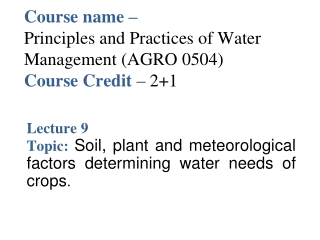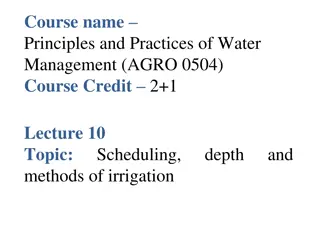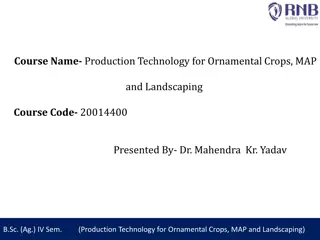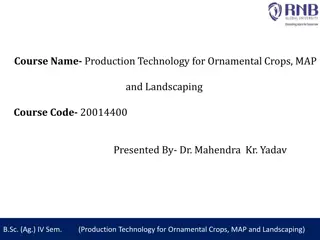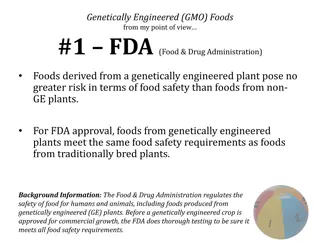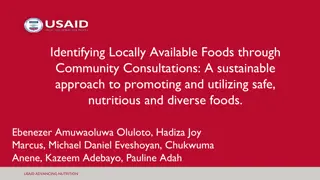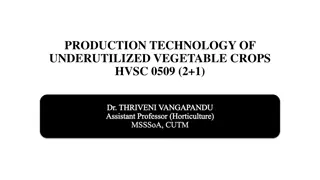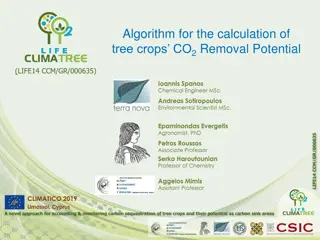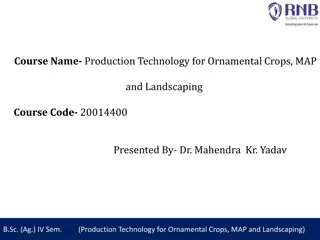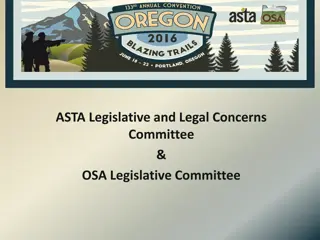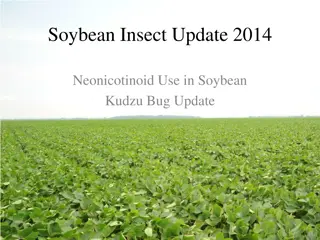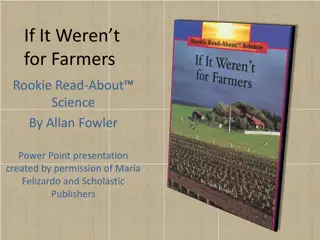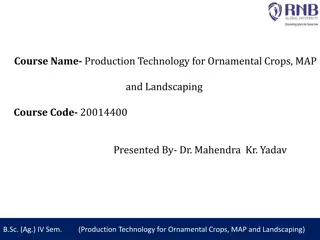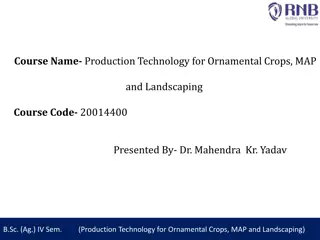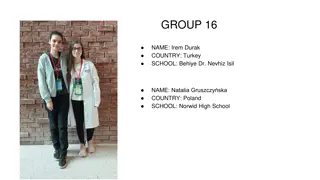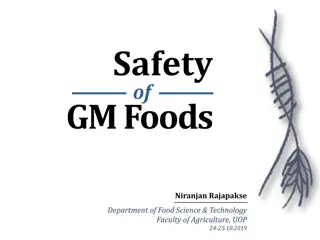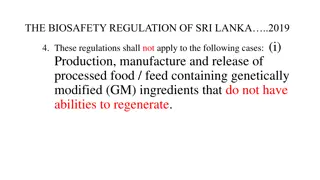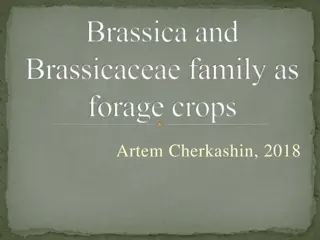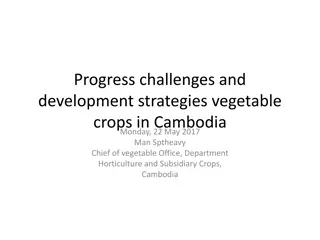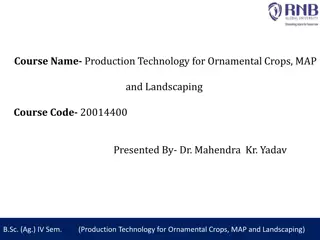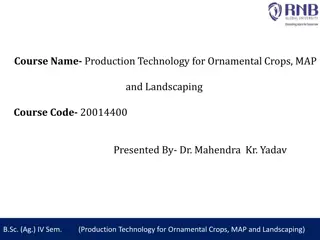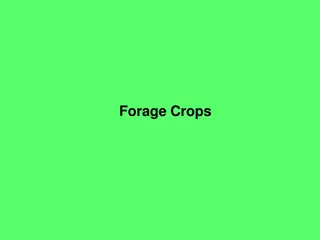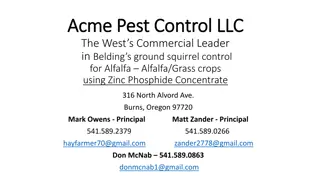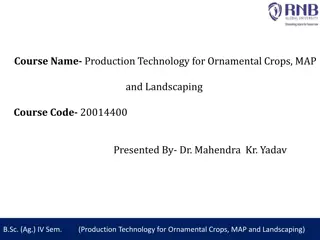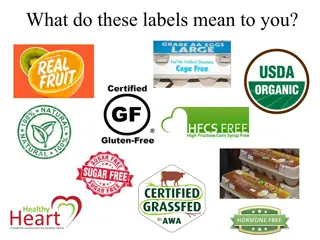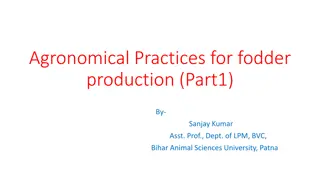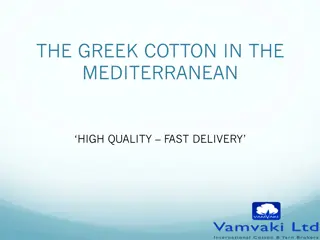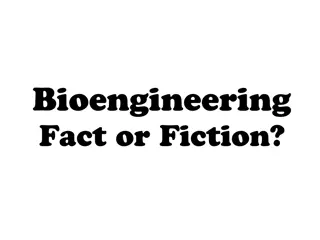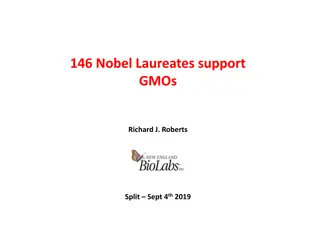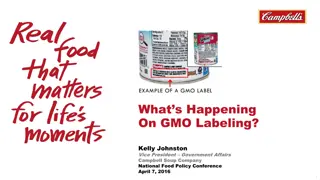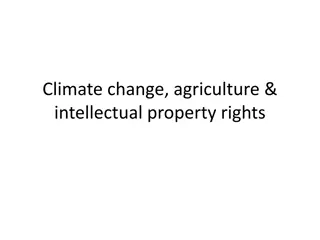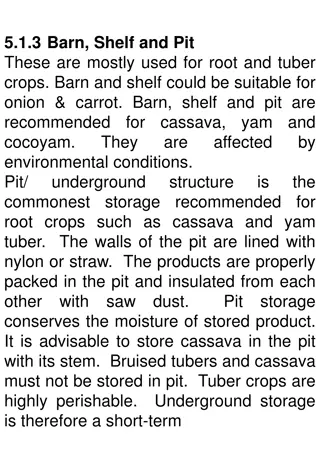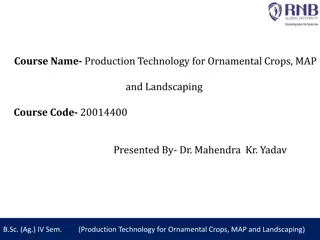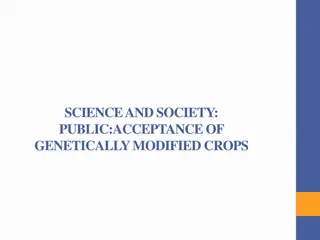Understanding Water Needs of Crops Based on Soil, Plant, and Climate Factors
How soil, plant, and meteorological elements impact water requirements of crops. Dive into the effects of temperature, solar radiation, pressure, wind, and humidity on crop production and growth.
2 views • 19 slides
Production Technology of Underutilized Vegetable Crops: Kale and Collards Overview
Explore the production technology and characteristics of underutilized vegetable crops Kale and Collards, including their origins, types, and growth habits. Learn about their nutritional value, cultivation, and unique features that make them ideal additions to kitchen gardens.
0 views • 13 slides
Understanding Irrigation Scheduling for Optimal Crop Yield
Scientific irrigation scheduling plays a vital role in determining the correct timing and quantity of water application for crops to enhance yields efficiently while preserving soil quality. Various criteria are utilized in irrigation scheduling, such as potential evapotranspiration (PET) estimation
13 views • 58 slides
Production Technology for Ornamental Crops and Landscaping: Ashwagandha Cultivation and Benefits
This course covers the production technology for ornamental crops, medicinal and aromatic plants, and landscaping practices. It emphasizes identifying different types of crops, landscaping principles, and the importance of processing and value addition in ornamental crops. Specifically, it explores
0 views • 11 slides
Production Technology for Ornamental Crops and Landscaping Course Overview
This course provides a comprehensive study on the production technology for ornamental crops, medicinal plants, and landscaping practices. Topics include identification of different crops, landscaping principles, package of practices for flowers, processing techniques, and more. Students will learn
2 views • 14 slides
Understanding Genetically Engineered Foods: Perspectives and Insights
FDA ensures the safety of genetically engineered (GMO) foods, EPA reviews their environmental impact, farmers benefit from improved crop management, some consumers prefer non-GMO products, and nutritionally, GM foods are similar to non-GM. While scientific consensus supports the safety of GMOs, glob
1 views • 6 slides
Promoting Sustainable Local Foods for Nutrition Security in Nigeria
Food and nutrition insecurity in Nigeria is a pressing issue, prompting efforts to identify and promote locally available, nutritious foods. Stakeholder consultations in Sokoto, Kebbi, and Bauchi States highlighted the importance of staple crops like rice and millet, as well as bio-fortified crops.
0 views • 7 slides
Production Technology of Underutilized Vegetable Crops HVSC 0509 & Sweet Baby Corn
This informative piece discusses the production technology of underutilized vegetable crops and the cultivation practices of sweet baby corn. It covers aspects such as the origin of baby corn, its nutritive value, different types of corn, major cultivars in India, and more. The content highlights th
4 views • 12 slides
Algorithm for Tree Crops CO2 Removal Potential
Algorithm for the Calculation of Tree Crops CO2 Removal Potential (LIFE14.CCM/GR/000635) focuses on efficiently determining the capacity of tree crops to remove CO2 from the atmosphere. This algorithm considers various factors such as the biological cycle of the tree, cultivation practices, and carb
1 views • 17 slides
Principles of Landscape Gardening and Landscaping Techniques
This course on production technology for ornamental crops, MAP, and landscaping covers the identification of ornamental and medicinal crops, principles of landscaping, uses of landscape trees, shrubs, and climbers, production technology of important ornamental crops, and more. It emphasizes the impo
0 views • 14 slides
Legislative Updates on GMO Labeling and Legal Compliance in Vermont
Mandatory GMO labeling legislation requiring disclosure of bioengineered ingredients, enforcement of Vermont Labeling Law since July 1, 2016, and guidelines for foods certified as not produced with genetic engineering in Vermont. The Attorney General provides guidance on compliance, including the ne
0 views • 35 slides
Neonicotinoids in Field Crops: Update on Soybean Insect Control
Explore the use of neonicotinoids in soybean crops to control pests like aphids and beetles. Learn about their mode of action, concerns regarding environmental persistence, and effects on bee behavior. Discover the current status of neonicotinoid use in field crops and its implications.
0 views • 33 slides
The Importance of Farmers in Our Food Supply Chain
Farmers play a crucial role in our food production, providing us with fruits, vegetables, dairy products, meat, eggs, grains, and more. They work tirelessly to grow crops, raise animals, and ensure a stable food supply for all. Different crops thrive in varying climates, from citrus fruits in warm r
1 views • 26 slides
Production Technology for Ornamental Crops, MAP, and Landscaping: Cinnamomum Production
This course covers various aspects of ornamental and medicinal crops, landscaping principles, and production technology. It explores the cultivation techniques of important ornamental crops, as well as issues related to medicinal and aromatic plants. Specifically focusing on Cinnamomum, the course d
0 views • 9 slides
Understanding Catch Crops and Kale Cultivation
Catch crops are fast-growing crops cultivated during fallow periods, offering advantages like providing additional winter fodder and preventing nitrogen leaching. Kale, a popular catch crop, has a biennial growth cycle and various varieties with different characteristics. Factors like soil suitabili
0 views • 17 slides
Production Technology for Ornamental Crops and Landscaping Course Overview
This course provides an in-depth study of ornamental and medicinal crops, landscaping principles, production technologies, and processing methods. It covers identifying different crop types, packaging practices for flowers, cultivation techniques like protected cultivation of Carnation, and the sign
0 views • 27 slides
Production Technology for Ornamental Crops, MAP, and Landscaping with Dr. Mahendra Kr. Yadav
This course on production technology focuses on identifying various ornamental and medicinal crops, exploring landscaping principles, production technology, package of practices for loose flowers, and problems with medicinal plants. It also highlights the importance of processing and value addition
0 views • 16 slides
Genetic Analysis of Corn Muffin Mix: GMO and Plant-Based Findings
A study conducted on Corn Muffin Mix using electrophoresis revealed that the sample is both genetically modified and plant-based. The results suggest that the GMO used in the study may also be genetically modified. The analysis was supported by visual data and information about the Jiffy brand known
0 views • 4 slides
Understanding the Safety and Regulation of GMO Foods
Explore the importance of genetically modified organisms (GMOs) in healthcare, agriculture, and food industry, along with the safety concerns, regulatory assessments, and international standards associated with GMO foods. Learn about the benefits, potential risks, and management strategies for ensur
1 views • 21 slides
GMO Regulations in Sri Lanka: An Overview of Biosafety and Prohibitions
Sri Lanka's biosafety regulations of 2019 exempt certain cases involving genetically modified (GM) ingredients in processed foods. The regulations outline prohibitions on the import, sale, and distribution of GM organisms as food without approval. Additionally, the regulations address risks in proce
0 views • 12 slides
Brassica and Brassicaceae Family as Forage Crops: A Comprehensive Guide
Understanding the Brassica and Brassicaceae family as forage crops is essential for maximizing agricultural yields. This article explores the taxonomy, main crops for fodder, and the specific characteristics of colza plants. Colza, both winter and spring varieties, offer high productivity and protei
0 views • 14 slides
Agricultural Progress, Challenges, and Development Strategies for Vegetable Crops in Cambodia
The agricultural sector in Cambodia plays a significant role, with vegetable crops being the third most important source of nutrition after rice, meat, and fish. The country faces challenges in vegetable production and distribution, but strategies are being developed for growth. Fruit crops and othe
0 views • 21 slides
Production Technology for Ornamental Crops, MAP, and Landscaping Course Overview
This course, presented by Dr. Mahendra Kr. Yadav, covers the identification of ornamental and medicinal crops, principles of landscaping, production technology, and value addition in ornamental crops and MAPs. Topics include jasmine cultivation, varieties of J. auriculatum, and more.
0 views • 21 slides
Production Technology for Ornamental Crops, MAP and Landscaping Overview
This course covers the production technology for ornamental crops, MAP, and landscaping, presented by Dr. Mahendra Kr. Yadav. It includes identifying different types of ornamental and medicinal crops, principles of landscaping, uses of landscape trees, shrubs, and climbers, production technology of
0 views • 9 slides
Understanding Forage Crops and Their Importance in Agriculture
Forage crops play a crucial role in agriculture, with members mainly from the Fabaceae and Poaceae families. These crops provide essential nutrition for ruminants and are cultivated worldwide. The value of forage crops is significant, comparable to non-forage plants, with varying land use patterns a
0 views • 49 slides
In-Depth Guide to Ground Squirrel Control for Alfalfa and Grass Crops
Acme Pest Control LLC specializes in ground squirrel control for Alfalfa and Grass crops using Zinc Phosphide Concentrate. Learn about their process, safety precautions, and successful track record in controlling Belding's ground squirrels. From preparing bait to handling applications, this comprehe
0 views • 15 slides
Dicamba: An Overview of Federal Perspective
The summary covers various aspects of dicamba including federal perspective, label changes, new uses for dicamba-tolerant crops, incidents of crop damage, and related investigations. It highlights the impact on crops, such as soybeans, tomatoes, watermelon, and more, caused by dicamba applications.
0 views • 13 slides
Production Technology for Ornamental Crops and Landscaping: Marigold Cultivation
Learn about the production technology for ornamental crops, including identifying different types of plants, landscaping principles, and the cultivation practices for marigold flowers. Explore the characteristics of French and African marigold varieties, their botanical names, climatic and soil requ
0 views • 13 slides
Understanding Bioengineered Crops and Labeling Regulations
Explore the world of bioengineered crops, misleading food labels, and the regulatory process behind genetically modified organisms. Learn about GMO crops, deceptive labeling practices, and how the FDA ensures food safety standards. Discover the differences between bioengineered and non-bioengineered
1 views • 11 slides
Agronomical Practices for Fodder Production - Part 1
Forage crops, fodder crops, and the characteristics of fodder crops are discussed in this informative content. It covers the classification of fodder into different types such as non-leguminous fodders, legumes, pasture grasses and legumes, fodder trees and shrubs, root crops, and miscellaneous fodd
0 views • 16 slides
Greek Cotton: High Quality and Sustainable European Production
Greek cotton stands out for its high quality, fast delivery, and sustainable production practices. With 79.4% of total European cotton production, Greece ensures contamination-free, non-GMO cotton for around 250,000 tons per year. The cultivation is supported by subsidies, making it an essential cas
0 views • 10 slides
Understanding GMOs: The Science and Impact
Bioengineered crops, or GMOs, are developed through genetic engineering to enhance specific traits. Despite thorough evaluation by regulatory bodies, GMOs have become prevalent in the market, especially in livestock feed production. While organic products offer a non-GMO guarantee, the adoption of b
21 views • 13 slides
Nobel Laureates' Support for GMOs and Food as Medicine
The article highlights the support of 146 Nobel Laureates for GMO technology, emphasizing its safety and importance for addressing world hunger. It also discusses the role of food as medicine and the need for promoting science honesty regarding GMOs. The message calls for the encouragement of GMOs f
1 views • 35 slides
Understanding the Current Landscape of GMO Labeling: Insights from Campbell Soup Company
Explore the evolution of GMO labeling, from defining GMOs to legislative developments and industry responses. Key points include the history of GMOs in food, global perspectives, state mandates like Vermont's Act 120, and how major food corporations are navigating the changing landscape. Follow the
2 views • 19 slides
Nobel Laureates Supporting GMO Technology for Global Food Security
142 Nobel Laureates, including Marc Van Montagu and Jeff Schell, emphasize the safety and importance of GMO technology in addressing global food insecurity. They urge organizations like Greenpeace to recognize the benefits of genetically modified crops for the developing world. The laureates stress
0 views • 34 slides
Challenges at the Intersection of Climate Change, Agriculture, and Intellectual Property Rights
The impacts of climate change on agriculture and the implications for intellectual property rights are explored in this content. Extreme weather events and rising temperatures are creating challenges for farmers, particularly those in developing countries who rely on subsistence agriculture. The eco
0 views • 47 slides
Modern Storage Solutions for Root and Tuber Crops
Explore traditional and modern storage structures suitable for root and tuber crops like cassava and yam. From pits and shelves to improved cribs and warehouses, learn about different storage methods to preserve these perishable crops effectively.
0 views • 4 slides
Production Technology for Ornamental Crops and Landscaping - Course Overview
This course covers the production technology for ornamental crops, MAPs, and landscaping, presented by Dr. Mahendra Kr. Yadav. Learn about identifying different types of ornamental and medicinal crops, principles of landscaping, production techniques for important ornamental crops like orchids, and
0 views • 9 slides
Production Technology for Ornamental Crops and Landscaping - Aloe Vera Cultivation
This course covers the production technology of ornamental crops, landscaping principles, and cultivation methods for Aloe vera plants. It includes identifying different ornamental and medicinal crops, landscaping principles, uses of landscape trees, and production techniques for important ornamenta
0 views • 10 slides
Public Acceptance of Genetically Modified Crops: Concerns, Status, and Trust Issues
The discussion explores the concerns surrounding genetically modified crops, touching on public acceptance, regulatory measures, and the current state of GM crops in world agriculture. Surveys conducted in the USA and UK reveal varying levels of public support, with issues of trust, safety, and ethi
0 views • 32 slides
